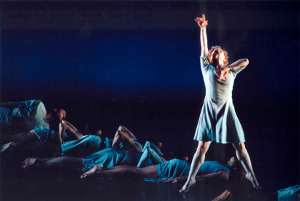The intimate Sunrise Theater was well filled with music lovers for the third of four concerts in the Classical Concerts Series season. It is organized and supported by the Moore County Arts Council. This concert featured the San Francisco based Alexander String Quartet, which is celebrating its thirtieth year. Its members are violinists Zakarias Grafilo and Frederick Lifsitz, violist Paul Yarborough, and cellist Sandy Wilson. There was nothing lightweight about the program, which featured significant works by Wolfgang Amadeus Mozart (1756-91), Ludwig van Beethoven (1770-1827), and Dmitri Shostakovich (1906-75).
I have always been partial to the sound of the cello, so the ensemble’s choice to open their program with Mozart’s Quartet No. 22 in B-flat, K.589, was ideal. This quartet is the second of what was to have been a set of six works dedicated to King Friedrich Wilhelm II of Prussia, whose instrument was the cello. Only the first three quartets (No.21, No. 22, and No. 23) were completed; the others were not composed since the hoped-for commission fell through, leaving the composer to sell the three works to the publisher Artaria for “Spottgeld” (a mere song).
The opening Allegro of K.589 is deceptively simple. The theme is introduced in the dominant by the cello. It opens and is featured extensively in the second movement Larghetto. A long, striking Trio section, with its pairing of instruments in turn, is a highlight of the third movement, Menuetto: Moderato. The concluding Allegro assai takes a simple theme in six-eight and gives it a delightful run for its money by decorating it with rapid scales and ranging through some surprising keys.
Everything must be exactly right in Mozart, and the Alexander Quartet delivered the goods in spades. Intonation was perfect, and the phrasing was superb. Balance among and between instruments was fine. Wilson brought a glowing, warm tone to the extensive cello parts.
The late string quartets of Beethoven became a challenging benchmark for composers ever since. His favorite, Quartet No. 14, in C-sharp minor, Op. 131, with its seven movements played without pause, set the bar highest. The opening Adagio is a fugue in C-sharp minor which leads to a dance-like Allegro vivace in D, which modulates from B minor to E in a brief Allegro moderato. This serves as a slow introduction to the heart of Op. 131, Andante, ma non troppo e molto cantabile, a set of six complete variations, one incomplete, and a coda on a theme in A. The brilliant Presto in E leads to a short Adagio quasi un poco andante in G sharp minor which serves as a slow introduction to the seventh movement. This Allegro returns to the home key of C-sharp minor and quotes the opening movement’s fugue before resolving in C-sharp major at the end.
The extensive experience of the Alexander Quartet musicians was evident in every phase of their performance. They have issued two separate complete Beethoven cycles on CD. The intensity and inevitability of their playing was breathtaking. Rhythms were rock solid, and every note was in place within a well-considered overview.
The concert ended with an equally committed and intense performance of Shostakovich’s Quartet No. 2 in A, Op. 68. Composed in September 1944, the four-movement layout is anything but standard. The opening Overture: Moderato con moto is in sonata form. The first violin opens theatrically with a triumphant theme in A before the movement skirts distant tonalities. The second movement, Recitative and Romance: Adagio, has two long declamatory unbarred solos for the first violin supported by long-held lower chords. The muted strings of the Valse: Adagio give it a haunted quality. The finale, Theme with Variations: Adagio, the emotional heart of the work, wrestles extensively with tonality.
First violinist Grafilo played the many extended violin solos brilliantly with marvelous warmth of tone. The plangent voice of Yarborough’s viola was a delight, as were solid low notes of Wilson’s cello. This was an extraordinarily effective performance.
The very warm reception from the audience was rewarded with an unusual encore, “The Way You Look Tonight,” by Jerome Kern. Fred Astaire originally sang it in the movie Swing Time (1936). Kern copyrighted the scoring for string quartet by Charles Miller in January 1942.
The Alexander String Quartet is Ensemble-in-Residence at San Francisco State University. Check the ensemble’s website for an impressive roster of CDs on the Foghorn Classics label. Out-of-print items on other labels, such as Arte Nova, may be available here. I look forward to future concerts with this group.
Note: The individual players in quartets generally change over time. One of the Alexander String Quartet’s former first chair violinists was Eric Pritchard, now the current first chair of the Ciompi Quartet of Duke University.











